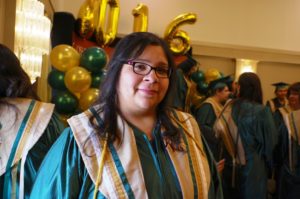Student success at Oshki-Pimache-O-Win

By Rick Garrick
THUNDER BAY—About 32 students graduated from three different diploma programs and four certificate programs during the Oshki-Pimache-O-Win Education and Training Institute’s 2016 Graduation Ceremony which was held at the Airlane Hotel and Conference Centre in Thunder Bay, Ontario.
Ojibways of the Pic River First Nation’s Cheri Tschetter was one of the six Aboriginal Early Childhood Education graduates. She looks forward continuing her work with children after graduating.
“I just want to be the best I can be and try to influence kids in a positive way,” says the class valedictorian and Pic River Children and Family Learning Centre employee. “I actually work in the pre-school class right now.”
Tschetter enjoyed studying in the five-semester program at Oshki, which provides students with an Aboriginal learning environment.
“It was awesome because of all the support we had — all the Oshki staff supported us in our education,” Tschetter says. “I really liked how the cultural (aspect) was incorporated throughout the whole process.”
Tschetter appreciated how the program schedule enabled the students to study in their home community for six out of every eight weeks. The Aboriginal Early Childhood Education students studied at the Oshki campus in Thunder Bay for two two-week sessions per semester, from from 8:30 a.m. to 8:30 p.m. every day.
“I stayed here for two weeks and then I travelled back home for the six weeks to go to work,” Tschetter says. “I would definitely encourage all people considering going back to school (to study at Oshki), especially the people who are in jobs, because it is so flexible and they are just there for you.”
Ontario Regional Chief, Isadore Day was the special guest speaker at the graduation ceremony, and actually had visited the Aboriginal Early Childhood Education class at Oshki only months before.
“I want to congratulate the students,” says Regional Chief Isadore Day during his keynote address, “you are actually so important in our communities and First Nation daycares. Even though we are underfunded in a lot of cases, our First Nation daycares are second to none. You have really the first role and responsibility in our communities out in that world where these young ones actually are going to become strong and you have a very important place in helping shape their life.”
Day says he began his studies as a mature student at a college, but it was not until he studied in another Aboriginal education institute that his story “started to balloon out.”
“That’s why I’m standing here today,” Day says. “I took the First Nations Public Administration and Governance program. I really was encouraged, not just by the education I was getting, but because of all the people that were around. I would see families; there would be mothers that would come in with their kids for courses, and it was like a family.”
Day firmly believes that the graduates’ successes academically, professionally, or personally are the successes of their communities as well.
“Your success is our success… that success is our communities’ success; that success is the success of our nations,” stated Day.
Two other Anishinabek graduates were also recognized for their success during the graduation ceremony: Biigtgong Nishnaabeg’s Ann Marie Otiquam in the Social Service Worker – Native Specialization Program and Red Rock Indian Band’s Brenda Fortier in the Personal Support Worker Program.


